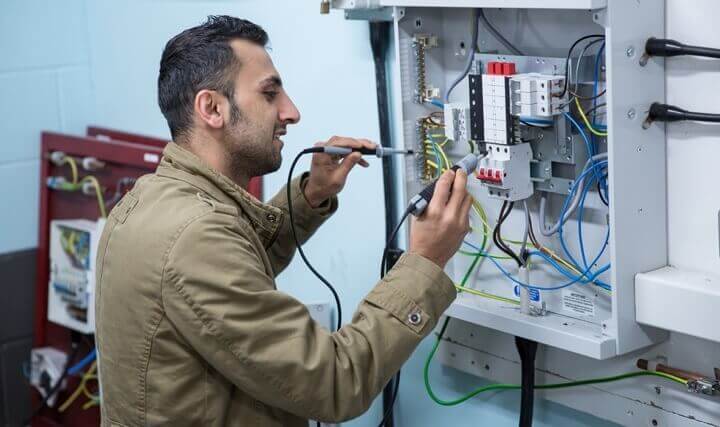
So you want to change careers and become a professional electrician? Great! You'll love the electrical trade, and the UK's current skills shortage means that you should have no trouble finding plenty of work, especially with our C&G electrical courses and qualifications.
But you can't start working as an electrician without the proper training and qualifications. Electrical work is very dangerous if you don't know exactly what you're doing, so it's very important to learn all the relevant theory, develop your skills under the supervision of an experienced electrician, and get certified before you begin your new career.
Here at Access Training, we offer a range of accredited City and Guilds electrical courses that are specifically designed for inexperienced electricians who want to train up, get qualified, and go professional. Even if you've never so much as changed a plug before, our City and Guilds electrical courses will mould you into a skilled electrician in no time - we'll teach you everything you need to know and help you to earn the industry qualifications that domestic electricians are expected to hold.
Browse our C&G Electrical Courses
Established in 1878, City & Guilds - or the City and Guilds of London Institute, to use its full name - is one of several trusted awarding organisations with whom we work to deliver high-quality electrical courses. If you're interested in earning City & Guilds electrical qualifications through our C&G electrical courses, Access Training can help.
What Electrical Qualifications can I earn with Access Training C&G Courses?
Depending on which training programme you choose, you can earn some or all of the following certifications on our City & Guilds electrical courses:
Domestic Electrical Installer
This is one of the basic industry qualifications that all electricians must hold. Part P qualifies you to install and repair lights, electrical sockets, cooker circuits, and other consumer units in domestic properties.
Included in the following electrical courses:
Essential // Professional // Premier
Level 3 Building Regulations
This is another must-have qualification that's included in all of our career change electrical courses. Earning this certification will show that you have a good working knowledge of the latest electrical regulations.
Included in the following electrical courses:
Essential // Professional // Premier
Level 3 Portable Appliance Testing (PAT)
Many self-employed electricians find that they can boost their income by performing PAT tests in addition to domestic installations and maintenance. This course component will teach you how to test electrical devices and prevent potentially dangerous accidents.
Included in the following electrical courses:
Essential // Professional // Premier
Level 2 Fundamental Inspection & Testing
Inspection and testing is an important skill for professional electricians to hold. This qualification - also known as City & Guilds 2392 - will allow you to inspect and test new installations (as well as new circuits on existing installations).
Included in the following electrical courses:
Essential // Professional // Premier
Level 3 Periodic Inspection & Testing
This qualification goes further than the City & Guilds 2392 certification, enabling you to issue safety reports and recommend any additional works that may be necessary. Sometimes known as City & Guilds 2391-51, the periodic inspection and testing qualification is ideal for budding electricians who wish to carry out commercial and industrial (as well as domestic) work.
Included in the following electrical courses:
Essential // Professional // Premier
Our electrician courses combine online learning with intensive hands-on training to give you a comprehensive understanding of your new trade in a relatively short timeframe. If you'd like to enrol on one of our C&G accredited electrical courses, please click on one of the course options listed above or contact Access Training today!
C&G Electrical Courses
Last updated 17 December 2021.
A recent survey conducted by Retail Company Screw fix, shows
that two out of five tradespeople were giving more quotes for work than a year
ago, and more than half of the trades people who took part in the survey said that
their business was better than the previous year, in particular, plumbers,
electricians and carpenters are extremely optimistic about their business
outlook during 2016.
In 2015, the skilled trade industry experienced an increase
in demand towards the end of the year, fortunately this trend has continued
into 2016, with one in seven tradespeople stating that they have too much work
on their books.Most of the tradespeople surveyed said that they expected
business to remain at the same level, or improve over the next 12 months.
If you are a regular reader of our blog posts, you will
notice that we write about the current skills shortage crisis that we are
currently experiencing in the UK regularly. The skills shortage is a huge issue
that we are currently facing. Currently in the construction industry alone
there is a shortage of 35,000 people, this figure naturally increases when
domestic tradespeople are added into the equation.
With the increase in demand, it is apparent that – even though
good for plumbers, electricians, gas engineers and carpenters, because it means
that there is no shortage of work, potential customers will soon start to run into
difficulties being able to find a trades person when they need them the most.
If these projections are correct, then 2016 could mean that many
tradespeople may start having to work long hours to keep up with the demand. This
means that now is the perfect time for people who are thinking about learning or
retraining as a skilled trades person or adding taking courses to develop their existing
skill set.
Here at Access
Training, we have developed alongside City & Guilds, and other awarding
bodies, a wide range of fully comprehensive courses that are suitable for people
who have no prior industry experience. Our courses will teach you the very
basics, through to the more advanced techniques used by trade professionals.
To find out more about our plumbing, carpentry or electrical courses, contact us today!
Today - the 8th of March, 2016 - is
International Women's Day. This annual event began more than 100 years ago, and every March it serves as a great opportunity to celebrate the amazing achievements of women all over the world.
However, IWD is also an opportunity to highlight the many areas where gender equality still hasn't been achieved, and regrettably, our own field is a prime example. Female workers are still astoundingly rare in the construction and trade industries; according to
this article from last year, women account for just
11% of the UK construction industry's total workforce, and only
1% of
those women actually work on construction sites. Women are similarly under-represented in trades such as plumbing and electrical work, and while the ratios are beginning to shift, it's clear that there's still a long way to go.
So how can we encourage more people to learn a trade and join these male-dominated industries? First of all, people need to
change their attitudes towards tradeswomen, and that applies both to the general public and to representatives of the trades in question. A couple of years ago, the
Telegraph ran an article suggesting that roughly one-third of the UK population would be "suspicious" of a female electrician, and countless tradeswomen have shared their stories of the sexist remarks that come their way . Here's one example from Hattie Hassan, founder of
Stopcocks Women Plumbers (originally reported on
Sky News in 2014):
"Someone sent me an email saying, 'Look, love...plain and simple, women can't be plumbers. You'll break a fingernail and have to go out shopping to console yourself. Or you'll go running screaming when you see a spider.'"
Clearly, these sort of attitudes aren't helping anybody - it's easy to see why a budding female plumber or gas engineer might be put off. For this reason, we also need to do work harder to encourage women to join these trades in the first place, and that responsibility, at least to some extent, falls to training providers like us. The promotional materials distributed by construction/trade training centres are often targeted specifically at male learners, but this approach benefits nobody - after all, it's in the training provider's interest to attract as many new students as possible, regardless of gender.
Here at Access Training, we try to make people of all genders/races/backgrounds feel welcome at our training centres. We realise that we could still be doing more - for example, most of the photos currently on
our website are of men, not women. But the sad fact of the matter is that, right now, most of the people who enquire about our courses are male, and while we are keen to do whatever we can to get more women working in the trade and construction industries, it seems that this goal will be extremely difficult to achieve until people - namely the people who are "suspicious" of female electricians, the people who tell women they "can't be plumbers", and anyone else who continues to perpetuate the false notion that women aren't cut out for these jobs - adopt a more positive, welcoming attitude towards people who, at the end of the day, are just as capable of mastering these skills as any man.
Trade training courses from Access Training:
A new initiative, known as ConstructED, has been launched to promote diversity in the world of construction. From plumbing courses to the building site, the new scheme aims to bring all genders, races, religions, physical abilities and sexualities into the construction industry.
The scheme has already been backed by the North East Chamber of Commerce (NECC) along with a number of construction – next stop the whole of the U.K.! Even here at Access, our plumbing courses, tiling courses and other trades training courses are dominated by white, heterosexual males. It’s time for a shake up!
There are myriad benefits to a diverse and representative workforce. Every individual brings their own set of skills, abilities and insights to the table and the more diverse the construction industry, the more ideas and talents our economy will benefit from.
This is the first scheme of its kind to be launched in the UK and has been designed to create fairer and more equal workplaces, where all Equality Act (2010) and European Commission on Human Rights obligations are met.
This means eradicating any form of harassment, victimisation and discrimination in the industry and ensuring every company who vie for a public sector contract have the requisite equality and diversity credentials.
At Access we believe in open and equal learning for all. We work hard to ensure our plumbing courses and alternative construction training courses are friendly and respectful environments where every student can reach their full potential, irrespective of their background, gender, race, religion, sexuality or physical ability.
To find out more about our open, flexible and welcoming plumbing courses, please get in touch with the Access team today on 0800 345 7492 to discuss your goals and your future!
If you’re looking to find work in the plastering business there are many ways you can find opportunities in the construction industry. Plastering is a skill that will always be in high demand and often the best way to learn a trade is with on the job training. However, those serious about plastering as a trade might want to look into one of the many plastering training courses available.
Working as a plasterer can be quite a lucrative career that provides a steady income and lots of work. Whether you find with a plastering firm or a firm that includes plastering in its range of services, you should find your skills are constantly in demand. You may also find that once you have been working in the trade for some time and have acquired extensive experience, you might want to go it alone and set up your own plastering business.
Get the Word Out
Plastering jobs are often obtained through word of mouth and speaking to other contractors. If you can get the word out that you are looking for work and that you are willing to work long hours and dedicate your time to learning the trade, you may find a job comes along quicker than expected. You may also want to enquire directly to construction site managers and tell them that you have some level of training or that you are willing to train on the job. Whilst you might get given light labourer duties at first, you can learn a lot by being on site and getting involved. If you can get yourself on a new-build construction site this is one of the best ways to learn more about the plastering and rendering skills you will be required to know.
Your local job centre will also have details of any plastering jobs in your area and also any training courses on offer. Grants are often available for training and you’ll learn everything you need to start plastering straight away. The good thing to know is that plasterers are always in demand. If you can prove your skills and your worth, you’ll find your phone constantly ringing with offers of work.
Fine Tune Your Skills
Plasterers often add other strings to their bow including painting, tiling and flooring. Many domestic clients will be looking for a tradesman that has a wide range of skills so taking the time to learn new trades will open up many more doors to you.

Following draft license modifications put before Parliament and a ruling from the Court of Appeal, solar PV systems will be eligible for the higher Feed in Tariff (FIT) rate. That means that domestic solar PV systems that are registered with a FIT provider before 3rd March 2012 will be eligible for a Feed in Tariff rate of 43.4/kWh.
Not prepared to accept the change, the DECC (Department of Energy & Climate Change) has indicated they will follow this ruling up by seeking permission to appeal to the Supreme Court. If the DECC is successful in the appeal process, this could herald yet more changes.
The current rates available to domestic solar PV customers are as follows:
- If customers register their solar PV installation before 3rd March 2012, they will be eligible for a FIT rate of 43.3p for each unit of power they generate and 3.1p for each unit of power that they export to the National Grid
- Customers registering from the 3rd March – 31st March will be eligible for a FIT tariff of 43.3p for every unit of power they generate up until the 1st April 2012. Any power generated after that date will be eligible for a rate of 21p for each unit.
- Between 1st April and 30th June, the Government proposes to give 21p for each unit of power generated and 3.1p for each unit that is sent back to the National Grid.
There’s never been a better time to consider solar PV for the home and you may indeed have seen more and more homes with solar panels fitted. In order to have solar PV panels fitted, your home will need to meet a minimum energy efficiency standard and that means you’ll have to acquire an Energy Performance Certificate (EPC) rating of ‘D’ or higher. Further reductions are proposed to the FIT rate in the future and these changes could be in place by 1st July 2012.
More and more people in the UK are starting to realise the benefits of generating their own energy and the changes to the FIT rate make installation look much more appealing. Solar PV panels are becoming less and less expensive and therefore more accessible to UK homeowners. In order to be eligible for solar PV you must own your own property in England or Wales and have your own mains electricity supply.
Renewable and sustainable energy seems to be high on the agenda in Parliament right now and there’s never been a better or more affordable time to tap into the sustainable energy market. Reduce your carbon footprint and your energy bills at the same time.
With the rising demand for solar comes a rise in the number of solar installers required in the UK. Access Training specialise in helping people find their vocation, whether that's plastering or solar PV. To find out more about how to begin training, browse the rest of the website or call the knowledgable Access team on 0800 345 7492.
Any spark qualifying on electrician courses over the next few months could find their finances under the close scrutiny of HMRC. In fact, contract electricians of all levels of experience could find their work and their income monitored very closely by Her Majesty’s Revenue & Customs over the coming year.
The ‘big push’ by HMRC has been taking place across the trades which are considered high risk industries for tax avoidance. This wave of intense scrutiny and bureaucracy is part of the government’s overall goal which is to cut back on benefit fraud, tax evasion and other ‘low-level’ financial crimes which cost the taxpayer millions of pounds every year.
Looking at the bigger picture, this move to closely monitor the earnings of those who have qualified on electrician courses is part of the country-wide austerity drive, aimed at reducing our deficit and minimising the need for cuts in essential areas such as health care and education.
Alongside tackling those qualified on electrician courses, HMRC have also been closely monitoring self-employed plumbers and other sole traders. According to those leading the campaign, the investigations will look closely at anyone who installs, maintains and tests electrical appliances and equipment.
The reason people will be monitored so closely after completing electrical courses is that electrical contractors working as sole traders are traditionally a little ‘foggy’ when it comes to income, figures and tax. Whether this is the result of dodgy accounting or simple forgetfulness is not clear – it may well be that qualified sparks who have taken all the requisite electrician courses have simply earned an unfair reputation.
Hopefully the ‘crackdown’ on those who have found work as self-employed sparks following electrician courses will show that the majority of those in the business are above board and legitimate.
If you would like to enjoy the freedom and lucrative wages of life as a self-employed electrician, speak to Access Training. We offer flexible, City & Guilds accredited electrician courses which will prepare you for life as an exceptional, passionate spark. Get in touch today on 0800 345 7492.
The importance of upgrading much of the UK’s vocational skills and plumbing training has been brought to the fore by City & Guilds, the biggest name in UK vocational education, with two million learners working towards a City & Guilds qualification every single year.
Recently City & Guilds have focussed their attention on Ireland, which is currently lacking in professionally qualified tradesmen and plumbing training graduates to meet the demands of a burgeoning population. In Ireland there is a shortfall in many of the trades, with plumbing training one area where increased participation is being actively encouraged.
A seminar is being organised by City & Guilds to highlight how plumber training and other types of vocational training need to be adapted to take account of emerging technologies and the skill levels required to work with them. There will also be a heavy focus on delivering a more carbon-efficient and environmentally responsible service.

At the seminar the City & Guilds will launch its new range of qualifications which aim to marry traditional vocational courses such as plumber training with emerging technologies which are geared towards sustainable energy and resource management.
As well as gearing traditional qualifications such as plumbing training towards future sustainability, City & Guilds are also introducing an entirely new range of qualifications which ensure a workforce will be in place to deal with the adverse effects of climate change which are increasingly coming to the fore. Such qualifications will include the operation of snow and ice clearing machinery.
Speaking before the seminar, Brid Healy, Country Manager of City & Guilds Ireland, said: “There has been much high-level and general discussion about the potential green wave of jobs which will emerge as Ireland looks to more sustainable development. However, the role that plumber training and vocational skills will play in delivering a sustainable future has not received much airing. Tomorrow’s seminar is about putting the issue of skills in our future development at the heart of policy conversations.”
If you’re looking for plumbing training courses which have one eye on the future, contact Access Training today. Our plumbing training courses have pass rates which represent some of the highest in the country. Call 0800 345 7492 for further information about our wide range of plumbing training courses.